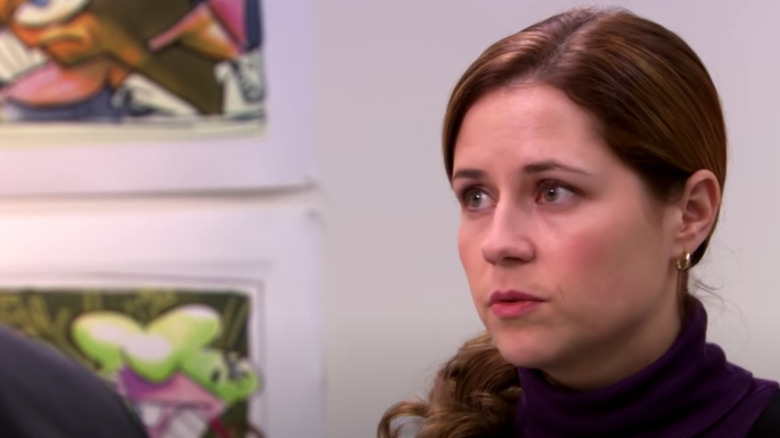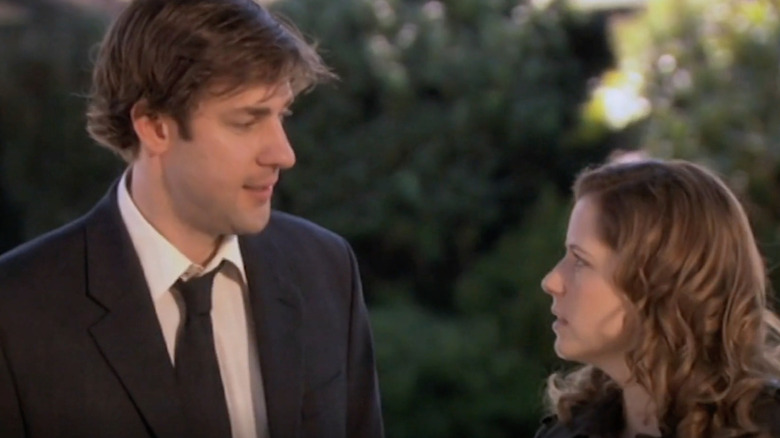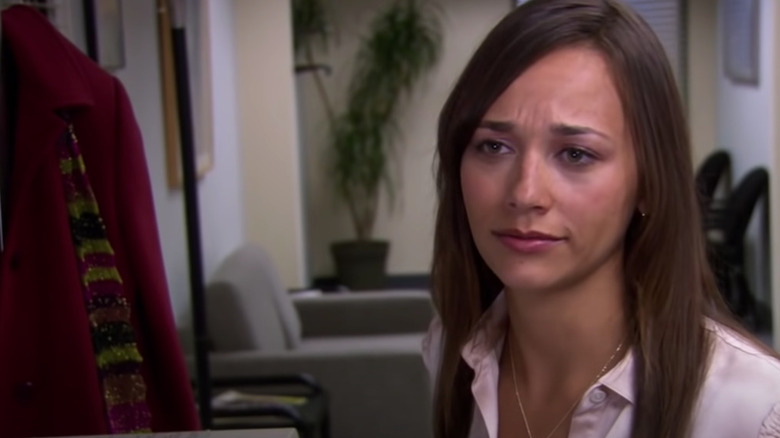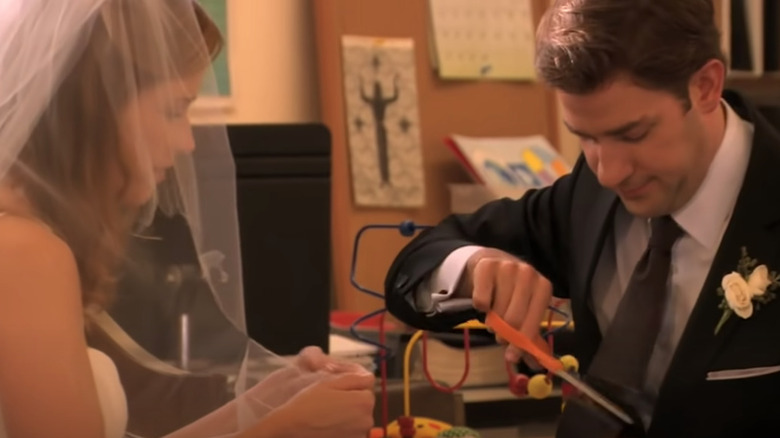The Office: Unpopular Opinions About Jim And Pam
"The Office" has long been lauded as one of the best sitcoms of all time. Based on Ricky Gervais and Stephen Merchant's British series of the same name, Greg Daniels' American "Office" quickly became part of the zeitgeist. The emergence of social media furthered the show's influence, as fans turned classic lines and memorable faces into omnipresent memes. At the core of "The Office" is paper company Dunder Mifflin's Scranton branch, run by Michael Scott (Steve Carell). The world's worst manager, Michael just wants to be loved — a fact his employees must constantly contend with. Among said employees are Jim Halpert (John Krasinski) and Pam Beesly (Jenna Fischer), an underachieving salesman and a bored receptionist, respectively.
For many viewers, Jim and Pam are the heart of the show. They're the "normal" ones whose will-they-or-won't-they romance has joined the canon of classic television love stories, alongside Ross and Rachel, Sam and Diane, and Carrie and Mr. Big. But for all that fans idealize this couple, if you look closely, you might find something less than desirable in their partnership. Indeed, where some see a depiction of soulmates, true love, and understanding, others see one of the worst couples to ever grace the television screen. What are these unpopular opinions people hold about the golden couple of Scranton, Pennsylvania? Read on to discover what some believe to be the dark side of Jim and Pam's romance.
Pam loves power games
Many see Pam as a sweet person who captures Jim's heart because she's loving, kind, and caring. Others, however, see Pam as being entirely too interested in power games. When "The Office" begins, Pam has been engaged to Roy (David Denman), her high school sweetheart, for years. This doesn't stop her from building a deep emotional connection with Jim, however. This wouldn't be an issue, except for the fact that she clearly has feelings for Jim, and knows he has them for her. Skeptical fans argue that Pam relishes the attention Jim gives her, while refusing to commit to either him or Roy.
When Pam finally does break up with Roy, it's too late for her to get with Jim, as he's with Karen. So, she returns to Roy during Phyllis' wedding. To be fair, Phyllis does replicate the wedding Pam and Roy would have had, which probably brings up a lot of emotions. While Roy isn't a good partner, he's also been openly trying to win her back. She's aware of this and agrees. In the minds of these fans, this is because she's too scared to be single. Pam, in their view, is willing to use someone she doesn't love, because she's too scared to truly look at herself. Instead, she looks to others for validation, and gets a superficial sense of power.
Jim is entitled
"The Office" offers a satirical look at American work culture. Like any good satire, it's grounded in reality. From the get-go, Jim doesn't want to do anything but the bare minimum for Dunder Mifflin, a feeling many viewers share about their own jobs. Frankly, this is valid — the company does make him put up with Michael Scott, after all. However, a deeper look reveals, in the opinion of some fans, a crucial truth: Jim is not so much critical of the system itself as much as he's just too entitled to work within it.
Jim has already been working as a sales rep at Dunder Mifflin for several years when the series begins. He constantly expresses having zero ambitions to move up in this world, unlike his arch-nemesis, Dwight. In fact, Jim tries to work as little as possible — yet he still gets promoted to Assistant Regional Manager (a devastating blow to Dwight). Later, he becomes co-manager with Michael. In spite of these promotions, Jim doesn't work any harder or more seriously, even though he could address some of things he's always hated about the job. Instead, he continues to coast, while remaining secure and entitled in his position.
Pam is dishonest and indecisive
While one could argue that Pam emotionally cheats on Roy by turning Jim into her office boyfriend, there is a moment when Pam fully, physically cheats. When Jim confesses his feelings to Pam and kisses her in "Casino Night," she kisses him back, then pulls away. She then tells him she's staying with Roy. Again, we are here for people choosing the life they want. But that's not what Pam does: She just cheats on Roy, breaks Jim's heart in the process, and keeps it a secret.
Perhaps Pam's lacking ethics stem from her indecision. She loves Jim and wants to be with him, but she's already (however half-heartedly) committed to Roy. Rather than deciding on one or the other, she doesn't really decide at all, as a way of not hurting them. This is understandable, but it's still cruel to keep it to herself from the person she's allegedly committed to. And of course, this leads to Pam hurting both Jim and Roy. Her indecision remains a constant problem on the series, as Pam struggles to figure out what she wants for herself and how to follow through. She ultimately makes progress, but that doesn't mean people didn't get hurt along the way.
Jim doesn't support Pam when it counts
"The Office" centers around people doing questionable and often terrible things, but not realizing it. Michael Scott is the king of this; the man just wants to be liked and have friends, but his approach usually winds up offending those he wants to make a part of his life. So it's not surprising to see Michael and others in the office (looking at you, Kevin) frequently degrade, objectify, and sexually harass Pam. But it is a bit surprising to realize that Jim never steps in to say something, or stop others from demeaning the woman he loves.
From day one, Jim is explicit about how wonderful he thinks Pam is. He clearly pays attention and listens to her — he's able to get thoughtful and meaningful gifts (like the teapot) that show he cares. So why doesn't he ever stand up for Pam when others in the office harass her? He has to know she hates it. Plus, we know he doesn't care that much about his job, so it's not like he'd be all that worried about the fallout of saying something. It's hard not to read Jim's silence as either reflecting the fact that he doesn't think this behavior is inappropriate, or, even worse, that he doesn't care. Either way, it makes one question just how supportive Jim really is of Pam — at least when it comes to the things that truly matter.
They're condescending
No one in "The Office" has a particularly good poker face when it comes to the antics of others, and Pam is no different. Jim is just as bad as she is — perhaps part of their deep bond comes from a shared love of looking down on others (and a shared love of expressing that via smug looks across the room).
Pam makes it clear that she doesn't think too highly of the efforts of people like Angela or Phyllis, her party planning committee sisters. Pam thinks they're lame, and while both Angela and even Phyllis give her reasons to have that opinion (Phyllis does steal Pam's entire wedding), they don't deserve all of the judgment it comes with. When Pam has her first art show, hardly anyone from the office shows up. This hurts, but it also makes sense: She hasn't made much of an effort to connect with her coworkers or make them feel valued. Regardless, Pam is hurt by the lack of interest. According to many who hold this opinion, this is just another instance of Pam looking outward rather than inward for a reason why.
Jim doesn't see Pam as his equal
Jim's love language seems to be to wax poetic about Pam in a romantic, hyperbolic way that isn't always grounded in Pam as an actual human being. This becomes particularly clear when you realize just how often he overrides her agency. For example, he confesses his love and kisses her while she's still engaged. Yes, she kisses him back, but Jim is the one who crosses that line without first confirming that she's willing to cross it too. She does, but then backs off, as Roy is still in the picture. Later on, Jim buys his parents' house without consulting Pam first. She's happy with it, but this is the sort of decision one should never make without one's spouse.
When Jim discusses changing careers, Pam says she feels uncomfortable with him doing it without more security. Regardless, Jim goes against her wishes and invests their money in his new business endeavor. Sure, it's his career, but he doesn't live in a vacuum — he has a family to consider. If Jim actually respected Pam as much as he says, he never would have done these things without talking to her. Actions speak louder than words, and Jim's make it clear that he sees Pam as an idea or vessel for his own needs, rather than a human who's equal in agency and deserving of respect.
Neither really supports women
Many people love that Jim and Pam only have eyes for each other: Their relationship is just about them, and anyone outside of it is irrelevant. However, this translates to something a bit darker — neither treats other women particularly well. Jim meets Karen (Rashida Jones) when he transfers to the Stamford office and they start dating. Karen is a delight: She's smart, funny, ambitious, adaptable, and strong. Pam disrespects Karen in various ways, especially after she tells her that she and Jim have a history, but that there's nothing between them anymore. Pam later publicly confesses her feelings for Jim while he's still with Karen, which leads to Karen's unceremonious dumping.
Jim also dates Katy (Amy Adams), a purse sales rep who comes to Dunder Mifflin to hawk her goods. When Katy reveals her desert island movie choices, both Pam and Jim are judgmental. Jim abruptly breaks up with Katy while on a booze cruise, after Roy announces his and Pam's wedding date. Jim values Katy so little, he's willing to dump her on a boat, from which she can't escape. Based on this, plus his treatment of Karen, it's clear that women are somewhat disposable to him.
They're mean to Dwight
Many see Jim and Pam as being perfect for each other. In some ways, this is true — for example, the two of them are extremely compatible in their love of terrorizing coworkers. The bulk of Jim and Pam's early intimacy and connection lies in their love of pranking Dwight (Rainn Wilson). Nothing brings Jim and Pam closer than the sweet joy of watching Dwight lose it as he thinks he's been recruited by the CIA or struggles to get his desk supplies out of a vending machine. Pam and Jim go so far as to learn Morse code just so they can make fun of Dwight in front of his face.
Jim and Pam's pranks are so extreme, they reflect an absence of conscience. Plainly put, the two of them delight in hurting another human being — Dwight may be annoying, but he doesn't deserve that sort of treatment. Jim seems to be more invested in pranking Dwight, but that doesn't let Pam off the hook — she laughs at the results unreservedly. Getting that much enjoyment out of someone else's misfortune is a problem.
They're smug
Jim and Pam's relationship is built on literal looks — the two of them are constantly making eyes at each other from across the office. Many find this charming, as it reinforces the narrative that in the midst of all this chaos, only Jim and Pam are sane. There's another way to see these looks, however: Jim and Pam are connecting with each other over a smug belief that they're the sane ones, which isn't necessarily borne out by reality.
As many fans who feel this way also consider Jim and Pam to be entitled and condescending, it's no surprise they find their glances smug. It's particularly clear in any interaction with Dwight, as both Jim and Pam feel confident that they're "normal," while Dwight is not. This leads them to mock him constantly. Sadly, Dwight isn't the only recipient of their disdain. When they discover that Kevin is part of a band and wants to play at Pam's wedding, rather than supporting their coworker's passion and musical pursuits, Jim and Pam make fun of him. It's par for the course for these two, who truly believe they're better than everyone else, even though they don't have much reason to think so.
They're sickeningly cutesy
Jim and Pam's cuteness is unparalleled, but depending on how you feel about them, it's either their best or worst quality. Many find said cuteness performative and uncomfortable, to the point of being saccharine. Consider Jim's reveal that he bought an engagement ring for Pam just a week after they started dating. Lots of fans love this, but others find it cloying, and even objectionable, given his tendency to idolize Pam.
This cutesiness also hides the fact that Jim and Pam's relationship doesn't really go that deep. It's easy to ignore this when there are romantic gestures galore (Jim cutting his tie at their wedding, for example), which mask the absence of a stronger connection. In other circumstances, Jim's constant talking about Pam to the camera (particularly before they get together) might seem sweet. But taken as a whole, these details just make some viewers want to throw up. Sometimes, it feels like the two of them fall back on adorability to avoid doing the work of a serious relationship.
They're not that funny
Many sitcoms rely on the "straight man" trope to balance out the wackiness of others' humor and shenanigans. In the world of "The Office," both Jim and Pam play that role to offset characters like Michael, Dwight, and Andy. That dynamic can be both valid and necessary. Ross Geller, Will Truman, and Ben Wyatt all serve this role in effective ways, as they ground "Friends," "Will & Grace," and "Parks and Recreation," while adding their own brand of humor.
Jim and Pam could have done this for "The Office," but there's one significant difference that gets in the way: They're really not that funny. Their absence of humor feels especially offensive, because acting as counterpoints to other, odder characters is what gives them their justification to be condescending to everyone else. Certainly, a series like "The Office" needs some sort of grounding, lest it become a parody that lives entirely on the surface. Jim and Pam could have offered that, if they'd just managed to be funnier in their "normalcy."
They're codependent
In many ways, our society promotes romantic codependence rather than independence. Phrases like "you complete me," "my other half," and, "when two become one" reflect the belief that a great, singular love is built from two lacking people. In this regard, Jim and Pam are right in line with society. But the fact that this is normalized doesn't mean their codependence is healthy.
Neither Jim nor Pam has much of a life outside of each other. They work together, and after they get married, continue doing so (until Jim changes careers). Other than Pam's interest in art, neither of them really seems to have hobbies or passions outside of their relationship. Codependency can be seen as a loss of self in another, as one person devotes themselves completely to a relationship. It can diminish agency, breed resentment, and even lead to abuse. Both Jim and Pam do this at the cost of their own senses of self. Without Pam, there is no Jim, and vice versa. While they don't see a problem with this, others are wary of such a narrative, and the effects it might have.
They negatively affect society's ideas of love
"The Office" has become such a cultural institution, its fans number in the millions. Many of these devotees elevate Jim and Pam above all other fictional couples as a cute, devoted pair who are clear soulmates. Yet everything that makes them "couple goals" can be understood through a different lens. They're devoted to romantic gestures that don't consider the other person. They're each represent the idea of a soulmate to the other, which doesn't really reflect their actual personhood. They use cuteness to distract from their actual issues. All of this is bad — and given the show's popularity, it has an actual cultural impact.
According to skeptical fans, Jim and Pam don't truly value or respect each other, which results in a codependent and unhealthy relationship. Yet their bond is rarely identified as such by most watchers, who hold Pam and Jim up as a romantic ideal. Is this really the sort of romance we want people idolizing? In the minds of many, the answer is a resounding no. To them, Jim and Pam are just another entry in a long list of toxic TV relationships that send damaging messages about love.













